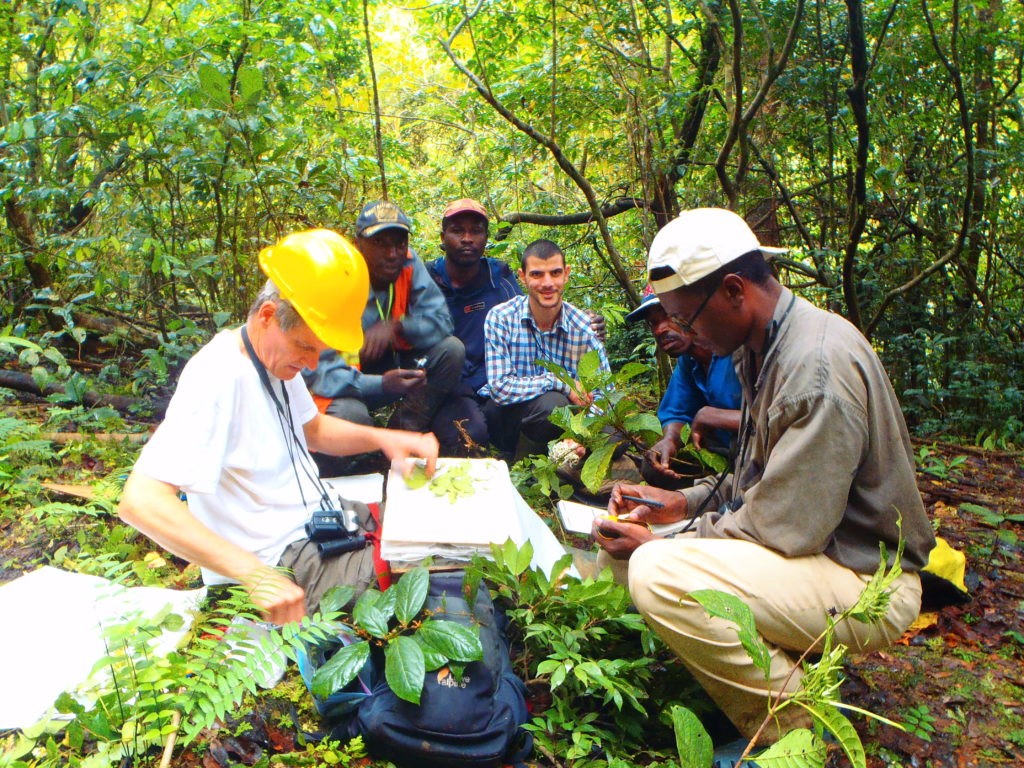Walking the Ebo forest of Cameroon Before the Next Pandemic
By Eric DJomo Nana

Botanists of Kew and the National Herbarium of Cameroon. Photo Credit: San Diego Zoo Global
Efforts to limit our next deadly pandemic will likely fail if we do not stop the relentless destruction of tropical forests—hotspots of emerging diseases—which are being sliced open and fragmented by rapidly expanding development projects. New roads and timber exploitation are slicing deep into the world’s tropical forests, amplifying the risks of pandemics (Myers, 1988; Pike et al., 2014). The original host of COVID-19 was probably a bat with intermediary species like pangolins, passing it to humans - making it a zoonotic disease. The massive handling and traffic of wildlife like pangolins to Wuhan, China, likely caused the virus to mutate in humans facilitating its transmission from human to human thus triggering the deadly outbreak. As countless new devastating timber exploitation projects open remote forests to poachers and wildlife traffickers, the flow of wildlife and pathogens to major consumer nations like China increase, creating more chances for lethal contagions to leap to humans.
What governments of tropical nations fail to understand is that the economic impact of pandemics can dwarf the potential returns of exploiting tropical forests (Pye et al., 2011). A good example is the Ebo forest (Figure 1), a proposed National Park, north and west of the Sanaga River in the Littoral Region of Cameroon in Central Africa. This forest was recently divided into two logging concessions (decisions N°0011 & N°0012 /AP/MINFOD/DF/SDIAF/ SC of February 2020) with the claim that this would put funds in government coffers immediately. See here and here.
The Ebo forest has the highest species diversity per square km in tropical Africa (Cheek et al., 2001), and the growing number of endemic species being discovered here makes it a hotbed for conservation. It is home to key populations of the only known culturally unique nut-cracking chimpanzee which also fishes for termites, along with an unspecified subspecies of gorilla, drills (population with highest potential for long-term drill survival), Preuss’s Red Colobus (one of only two remaining globally), forest elephants, Goliath frog (largest living frog on Earth), and many more.
As for plants, sampling though not yet complete, indicates the diversity and endemism levels are likely similar in global importance as primates, and among the top sites in Africa (Cheek et al., 2001; 2018). Twelve species new to science have been discovered at Ebo from the recent surveys by the Royal Botanic Gardens, Kew in the UK, and the National Herbarium of Cameroon (Pic). Because of the numerous globally threatened and unique plant species at Ebo, it could soon be a Tropical Important Plant Area (TIPA).
It is worth noting that a rich biodiversity also implies countless pathogens like COVID-19 that can spill over to humans through wilderness destructive projects, thereby creating more chances for another lethal contagion. To try averting the next pandemic, we must safeguard our wilderness areas from the clutches of harmful projects in the tropics.
References
Cheek, M., Mackinder, B., Gosline, G., Onana, J.-M. & Achoundong, G. 2001. The Phytogeography and Flora of Western Cameroon and the Cross River-Sanaga River Interval. Syst. Geogr. Pl. 71: 1097-1100.
Cheek, M., Prenner, G, Tchiengué, B, Faden, R.B. 2018. Notes on the endemic plant species of the Ebo Forest, Cameroon, and the new, Critically Endangered, Palisota ebo (Commelinaceae). Plant Ecology Evolution, 151: 434-441.
Myers, N. 1988. Tropical forests: Much more than stocks of wood. J. Trop. Ecol. 4: 209 – 221.
Pike, J., Bogich, T., Elwood, S., Finnoff, D.C. & Daszak, P. 2014. Economic optimization of a global strategy to address the pandemic threat. PNAS 111(52): 18519-18523.
Pye, JM., Holmes, TP., Prestemon, JP., Wear, DN. 2011. Economic impacts of the southern pine beetle, pp. 213–234. In Coulson RN Klepzig KD (eds.), Southern pine beetle II. U.S. Forest Service Southern Research Station General Tech. Rpt. SRS-140. U.S. Forest Service Southern Research Station, Asheville, NC.
________________________________________________________
Eric DJomo Nana is the President of Cameroon’s Chapter of the Society for Conservation Biology